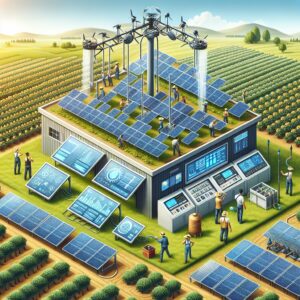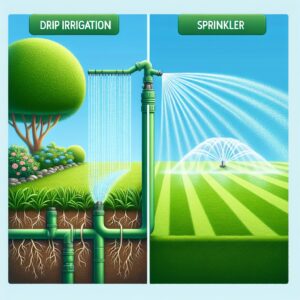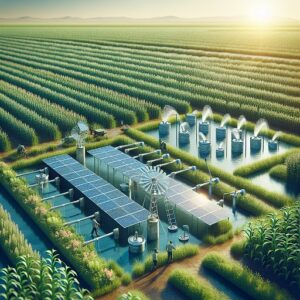
Key Takeaways
-
Lithium-ion batteries provide high energy efficiency, making them ideal for solar irrigation systems.
-
These batteries have a longer lifespan and can significantly reduce operational costs over time.
-
Smart technology integration maximizes water resources, leading to more sustainable farming practices.
-
While lithium-ion batteries have many advantages, it’s essential to understand any potential drawbacks.
-
Proper setup and maintenance of your solar irrigation system are key to reaping the full benefits of lithium-ion batteries.

Why Lithium-Ion Batteries are Revolutionizing Solar Irrigation
When it comes to powering solar irrigation systems, the choice of battery can make all the difference. And right now, lithium-ion batteries are leading the charge. They’re not just another power source; they’re a game-changer for sustainable agriculture. Let’s dive into why they’re so crucial for your farm’s future.
Unmatched Efficiency for Sustainable Farming
Efficiency is king in solar power, and lithium-ion batteries wear the crown. These batteries charge faster, last longer, and waste less energy. Why does that matter for you? Because with every drop of water being precious, you can’t afford to lose power due to inefficient batteries. Lithium-ion batteries ensure that the energy your solar panels capture is used to its fullest potential.
-
Charge quickly and retain energy better than other battery types.
-
Reduce energy waste, translating to more water pumped per solar charge.
Most importantly, this means you can keep your crops hydrated without a hitch, even when the sun isn’t shining. That’s the kind of reliability that can make or break a harvest.
Long-Lasting Performance Meets Agricultural Demands
Imagine not having to worry about replacing your solar irrigation system’s batteries for years. That’s the peace of mind lithium-ion batteries can offer.
Lithium-ion batteries aren’t just efficient; they’re also durable. They can handle the rigorous demands of farming, from extreme temperatures to long operational hours. And because they have a longer lifecycle, you won’t be stuck replacing them as often as other batteries. This means more time growing and less time maintaining.
Therefore, you can focus on what you do best—farming, while your solar irrigation system works efficiently in the background.

The Core Benefits of Lithium-Ion in Irrigation
The integration of lithium-ion batteries in irrigation systems offers a multitude of benefits. From longer lifespan and energy efficiency to faster charging time and environmental friendliness, these batteries have revolutionized the way irrigation systems operate. With the agriculture industry facing increasing pressure to be more sustainable, the use of lithium-ion batteries in irrigation systems is a step in the right direction towards a more efficient and environmentally-friendly future.
Cutting Operational Costs with High-Energy Batteries
Let’s talk numbers. Switching to lithium-ion batteries might seem like a significant investment upfront, but the savings are just as substantial. These batteries can last twice as long as traditional lead-acid batteries, meaning you’ll purchase fewer over the lifetime of your solar irrigation system. Plus, their higher energy density means you’ll need fewer batteries to do the same job, saving you space and money.
-
Longer lifespan reduces the frequency of battery replacements.
-
Higher energy density means fewer batteries are needed, saving costs and space.
Because of these factors, lithium-ion batteries can drastically cut your operational costs, giving you more financial freedom to invest back into your farm.
Maximizing Water Resources Through Smart Technology
Integrating lithium-ion batteries with smart technology takes the efficiency of solar irrigation to a whole new level. Smart irrigation systems can adjust water delivery based on weather forecasts, soil moisture levels, and crop needs. By harnessing the power of data, these systems ensure that every ounce of water is used judiciously, reducing waste and conserving this vital resource.
-
Smart sensors adjust irrigation schedules for optimal water usage.
-
Data analytics help predict the best times to irrigate, reducing waste.
With a lithium-ion battery as the backbone, these smart systems can operate reliably, ensuring that the technology designed to save water does so without interruption.
Any Drawbacks for Using Lithium-Ion Batteries with a Solar Irrigation System
While lithium-ion batteries are a fantastic choice for many reasons, it’s important to consider the full picture. They do come with a higher initial cost compared to traditional batteries. Also, they require a proper recycling process due to their chemical composition. Farmers must weigh these factors against the long-term savings and environmental benefits these batteries provide.
This below table shows the benefits and drawbacks of using Lithium-Ion Batteries with a Solar Irrigation System:
|
Benefits of Lithium-Ion Batteries |
Explanation |
Drawbacks of Lithium-Ion Batteries |
Explanation |
|---|---|---|---|
|
1. High energy density |
Lithium-ion batteries have a high energy density, meaning they can store a large amount of energy in a compact size. This allows for efficient storage of solar energy, maximizing the effectiveness of the irrigation system. |
1. Higher initial cost |
Lithium-ion batteries tend to have a higher upfront cost compared to other types of batteries, which may be a barrier to adoption for some users. |
|
2. Longer lifespan |
Lithium-ion batteries generally have a longer lifespan than traditional lead-acid batteries. They can endure more charge-discharge cycles, resulting in greater durability and reliability over time. |
2. Limited availability in some regions |
In certain areas, lithium-ion batteries may not be as readily available compared to other battery types, potentially limiting their accessibility for users. |
|
3. Fast charging |
Lithium-ion batteries can be charged quickly, allowing for faster turnaround times between irrigation sessions. This ensures uninterrupted operation of the system, even on days with limited sunlight. |
3. Risk of thermal runaway or fire if mishandled |
There is a risk of thermal runaway or fire if lithium-ion batteries are mishandled, overcharged, or exposed to adverse conditions, posing safety concerns. |
|
4. Maintenance-free operation |
Lithium-ion batteries require minimal maintenance compared to other battery types such as lead-acid batteries. They do not need watering or equalization, reducing the overall maintenance costs and hassle. |
4. Capacity degradation over time |
While lithium-ion batteries generally have a longer lifespan, they still experience gradual capacity degradation over time due to factors such as cycling and aging. |
|
5. Environmentally friendly |
Lithium-ion batteries are considered more environmentally friendly than traditional lead-acid batteries. They do not contain hazardous materials like lead or acid, reducing the risk of environmental contamination. |
5. Complex manufacturing process may have environmental impacts |
The manufacturing process of lithium-ion batteries is complex and may have environmental impacts such as energy consumption, resource depletion, and waste generation. |
|
6. Remote monitoring and control |
Many lithium-ion battery systems come with built-in monitoring and control capabilities. This allows users to remotely monitor battery status and performance, enabling proactive maintenance and troubleshooting to optimize system efficiency and reliability. |
6. Limited options for recycling and disposal compared to lead-acid batteries |
While efforts are being made to improve lithium-ion battery recycling technologies, there are still limited options for recycling and disposal compared to lead-acid batteries, posing challenges in managing end-of-life batteries. |
This table provides a comprehensive comparison of the benefits and drawbacks of using lithium-ion batteries in a solar irrigation system, along with explanations for each point.
That said, the advantages often outweigh the drawbacks, especially when considering the long-term sustainability of your irrigation system.
Setting Up Your Solar System: A Step-by-Step Guide
Setting up a solar irrigation system with lithium-ion batteries isn’t rocket science, but it does require careful planning. From choosing the right batteries to installing the panels, every step is crucial to ensure your system runs smoothly and efficiently.
Choosing the Right Lithium-Ion Battery for Your Farm
First things first, you need to select the right battery for your needs. Consider the size of your irrigation system and the typical sunlight your location receives. A larger capacity battery might be necessary for bigger systems or areas with less consistent sunlight.
Next, think about the battery’s quality and warranty. A good warranty can save you from headaches down the road, so don’t skimp on this. Finally, consider the manufacturer’s reputation—opt for companies known for their commitment to quality and service.
When you’ve made your choice, it’s time to get your hands dirty—or rather, to let the professionals do so.
Essential Tips for a Successful Solar Irrigation Installation
Installation is a critical step that can affect the performance and longevity of your solar irrigation system. Here are a few tips to ensure a smooth setup:
-
Choose a professional installer with experience in solar irrigation systems.
-
Ensure the solar panels are positioned to capture maximum sunlight throughout the day.
-
Check that all components are compatible and correctly connected to avoid technical issues.
Remember, a well-installed system will save you time and money in the long run, so don’t cut corners during the installation process.

Maintenance Best Practices for Lithium-Ion Batteries
Now, let’s talk maintenance. Lithium-ion batteries are low maintenance, but they’re not no maintenance. To get the most out of your investment, you’ll need to keep an eye on a few things.
Protecting Your Investment: Regular Battery Check-Ups
Periodic check-ups are essential to maintaining battery health. Monitor the battery’s charge levels and look out for any signs of damage or wear. Keeping the batteries clean and free from debris will also go a long way in preserving their functionality.
And don’t forget about software updates. If your system uses smart technology, keeping the software up to date will ensure everything runs as efficiently as possible.
Common Pitfalls in Battery Maintenance and How to Avoid Them
Even with the best intentions, it’s easy to fall into some common maintenance traps. Here’s how to avoid them:
-
Avoid overcharging or deep discharging your batteries, as this can shorten their lifespan.
-
Don’t ignore the operating temperature guidelines—extreme temperatures can damage batteries.
-
Stay on top of firmware updates for your battery management system to ensure optimal performance.
By steering clear of these pitfalls, you’ll keep your lithium-ion batteries in top shape, powering your irrigation system for years to come.
Emerging Innovations in Battery Technology
As we look to the future, it’s clear that battery technology is not standing still. Innovations are emerging that promise to make lithium-ion batteries even more efficient and farmer-friendly. We’re talking about advancements like solid-state batteries, which could offer higher energy densities and even longer lifespans. These developments are not just good news for tech enthusiasts but for farmers who will see direct benefits in the form of more robust, long-lasting energy storage solutions for their solar irrigation systems.
Another exciting innovation is the integration of battery technology with the Internet of Things (IoT). This means that batteries will not only store energy but also communicate with other devices, providing real-time data on their health and efficiency. This level of smart technology integration could lead to unprecedented levels of automation and optimization in solar irrigation practices.
The Future Impact of Efficient Batteries on Farming
So, what does all this mean for the future of farming? In short, it’s a brighter, more sustainable outlook. Efficient batteries like lithium-ion are set to play a pivotal role in helping farmers reduce their carbon footprint, lower their operating costs, and increase their resilience against climate change. As battery technology continues to improve, we can expect solar irrigation systems to become even more reliable and cost-effective, empowering farmers to do more with less.
Imagine a farm where every drop of water is used with precision, energy costs are minimal, and crop yields are consistently high. That’s the kind of future efficient battery technology is paving the way for. It’s an exciting time to be in agriculture, and batteries are at the heart of this green revolution.
Frequently Asked Questions
Let’s tackle some common questions you might have about lithium-ion batteries and solar irrigation systems.
How do lithium-ion batteries save costs compared to traditional methods?
Lithium-ion batteries save costs primarily through their high energy efficiency and long life span. Unlike traditional lead-acid batteries, they don’t need to be replaced as often, which means less downtime and lower long-term investment. Additionally, their ability to maintain a consistent charge allows for more predictable and optimized irrigation schedules, reducing water and energy waste.
It’s a simple equation: more efficiency plus longer life equals more savings. In the long run, the initial investment in lithium-ion batteries can lead to significant cost reductions, making them a smart choice for cost-conscious farmers.
What is the expected lifespan of a lithium-ion battery in irrigation?
The expected lifespan of a lithium-ion battery in an irrigation system can vary, but it’s generally between 5 to 10 years. This lifespan can be extended with proper care and maintenance, such as avoiding extreme temperatures and keeping the battery at optimal charge levels. It’s important to note that even as the battery ages, it will still function, just at a reduced capacity.
When you consider that traditional batteries might need to be replaced every 2 to 3 years, the longevity of lithium-ion batteries is a clear advantage.
Can solar irrigation systems with lithium-ion batteries work in cloudy climates?
Yes, solar irrigation systems equipped with lithium-ion batteries can work in cloudy climates. These batteries are capable of storing large amounts of energy when the sun is shining, which can then be used during overcast days. Additionally, modern solar panels are becoming increasingly efficient at capturing solar energy even in low-light conditions, which complements the high storage capacity of lithium-ion batteries.
With the right system design and battery capacity, a solar irrigation system can be a reliable solution for farms in regions with less consistent sunlight.
Conclusion: Is using Lithium-Ion Batteries with a Solar Irrigation System a Good Investment for Farmers?
In conclusion, lithium-ion batteries are not just a good investment for farmers—they’re a great one. With their superior efficiency, longevity, and compatibility with smart technology, these batteries offer a sustainable and cost-effective solution for solar irrigation needs. They represent a significant step forward in agricultural technology, empowering farmers to be more productive, more sustainable, and more resilient to the challenges of modern farming.
Adopting lithium-ion batteries for solar irrigation is more than just upgrading a power source; it’s about embracing a future where farms operate in harmony with the environment. It’s about ensuring that the food we grow is produced responsibly and sustainably. And most importantly, it’s about giving farmers the tools they need to succeed for generations to come.






